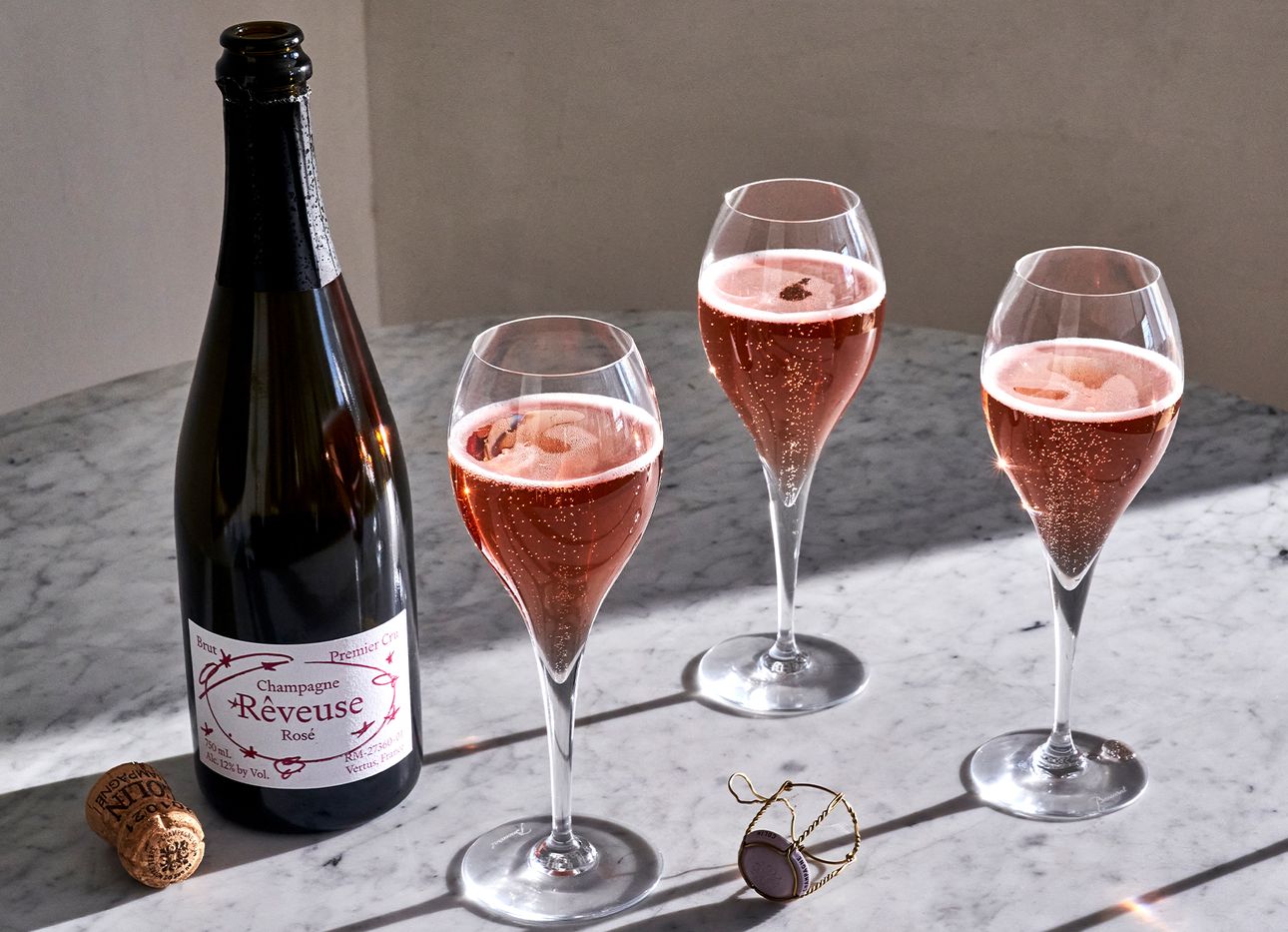
A “Grower Champagne” Brand Sources Its Wines From Independent Vineyards That Opt for Flavor Over Flash
Twenty years ago, April Siler had a chance encounter with “grower Champagne”—wines made from grapes in the Champagne region of France that are harvested, processed, and bottled by the same estate that grew them. (The category stands apart from Champagne houses, such as Veuve Clicquot, Moët & Chandon, and Dom Pérignon, which typically blend together grapes grown by multiple growers from across the region.) Awed by grower Champagne’s fuller flavor and vibrant, fruity savor, the Melbourne-reared, Brooklyn-based food and beverage executive set out to learn more about the niche sector, and to cultivate a greater U.S. recognition for its production.
Together with marketing executive Lauren Egan and sales officer Katie Eshuys, Siler launched the grower Champagne brand Rêveuse this past spring. It sources its wines exclusively from independent Champagne estates that cultivate the grapes without the use of herbicides or irrigation systems (the fruit depends on water from the soil and rain). By nature, Siler explains, grower Champagne producers have small, biodynamic ecosystems in place that help preserve the land for future generations. Limited bottlings, meanwhile, offer a richer, more nuanced taste, with a focus on quality over quantity and flavor over flash. “It’s the difference between freshly squeezed orange juice and the market-bought stuff in a carton,” Siler says. “Any time something is made in a small batch, you’ll have a more lively product.” Also, she continues, one need not be a connoisseur to taste the difference that results from the superior blending: “These wines just have more freedom to express themselves.”
Unlike most major Champagnes, which are “red forward” (meaning they derive their dominant flavors from red wine), Rêveuse’s three varieties capture the liveliness and crisp apple taste of Chardonnay, the only white grapes grown in the Champagne region. Sea deposits in the soil add a touch of saltiness to the chalk of the earth there, resulting in a mix of acidic, sweet, and salty flavors that add a complexity to the wine. All of the company’s drinks are vegan (some Champagne is processed using animal-derived fining agents to clarify the product); marked with an RM number on the label (Récoltant Manipulant, an industry code used to denote that a grower farmed the grapes and produced the Champagne on their property); and contain low levels of preservatives—less than 50 milligrams per liter.
Each variety sparkles in its own way. Lightly sweet and acidic, the Cuvée Brut, made from 65 percent Chardonnay grapes and 35 percent Pinot Meunier, is the most accessible in both taste and price point. It’s the signature blend of Champagne Colin, a seven-generation grower in the Vertus village of Champagne that uses farming methods certified by France’s High Environmental Valuation organization, and is currently helmed by Delphine Colin, the first woman in a leadership role at the vineyard. (Champagne Colin produces all three Champagnes that Rêveuse currently offers; the company will debut two varieties by Champagne Trudon, another certified grower-producer, later this year.) Siler says her first sip of the Blanc de Blancs Premier Cru Brut, which is made with 100 percent Chardonnay grapes, sealed their partnership with its crisp, richly refined finish and subtler taste that lends itself to food pairing. Last, instantly recognizable by its vivid pink color, the very dry, not-as-sweet-as-it-looks Rosé Premier Cru Brut is made from a blend of 85 percent Chardonnay grapes and 15 percent Pinot Noir from some of the region’s oldest vines. Its notes of cherry and strawberry balance out the crispness of its Blanc de Blancs base.
Siler and her partners plan to continue adding other grower-producers to their roster in the coming years. She says those she has contacted to date have been very responsive. “These are farmers,” Siler says. “They want to see what they grow—their Champagne—consumed.” Beyond the grapes and how they’re processed, Siler continues, Rêveuse is about creating something that has the power to elevate any occasion while bringing friends and family together. “To me,” she says, “that’s true luxury.”